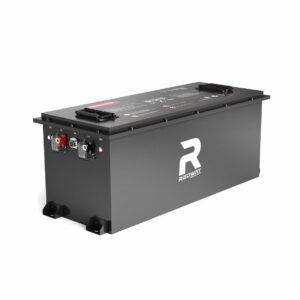What Are the Best Lightweight Marine & RV Batteries for Your Vehicle
What are the best lightweight marine & RV batteries? The top lightweight options include lithium-ion batteries like Battle Born LiFePO4, Renogy Deep Cycle, and Optima AGM. These batteries offer high energy density, durability, and fast charging, making them ideal for RVs and marine applications. Lithium-ion models reduce weight by up to 70% compared to lead-acid while providing longer lifespans.
How Do Lithium-Ion Batteries Outperform Traditional Lead-Acid for RVs?
Lithium-ion batteries deliver 3-5x longer cycle life (2,000-5,000 cycles) vs. 300-500 cycles for lead-acid. They weigh 50-70% less, charge 5x faster, and provide consistent power output even at low charge levels. Unlike lead-acid, lithium models don’t require maintenance, venting, or upright positioning, making them safer and more versatile for RV installations.

Recent advancements in lithium technology have introduced self-healing cells that recover from minor damages, extending operational life. These batteries also excel in partial state-of-charge (PSOC) conditions common in RVs, maintaining efficiency where lead-acid would sulfate and degrade. For winter travelers, some lithium models now integrate heating pads to enable charging in sub-freezing temperatures. The table below shows key performance comparisons:
| Feature | Lithium-Ion | Lead-Acid |
|---|---|---|
| Weight per 100Ah | 31 lbs | 60-70 lbs |
| Usable Capacity | 100% | 50% |
| Charge Time (0-100%) | 2-4 hours | 8-12 hours |
What Safety Features Are Critical for Marine & RV Battery Systems?
Key safety features include thermal runaway protection, built-in battery management systems (BMS), flame-retardant casing, and waterproof ratings (IP67+). Lithium batteries require pressure relief valves and cell-balancing technology. Marine batteries need corrosion-resistant terminals and US Coast Guard certification. All systems should include overload protection and automatic shutoff during short circuits.
Best RV Batteries at Sam’s Club
Advanced BMS now monitor individual cell voltages with ±0.5% accuracy, preventing over-discharge that causes irreversible damage. Marine-specific batteries feature vibration resistance up to 5G forces and saltwater immersion protection. For lithium systems, UL 1973 certification ensures compliance with aviation-grade safety standards. Fire prevention is enhanced through ceramic separators that melt at 302°F, creating internal short-circuit barriers. Emergency disconnect switches have become mandatory in marine installations, allowing manual power cutoff during emergencies.
“Modern lithium batteries are revolutionizing RV and marine power. At Redway, we’ve seen 62% fewer weight-related chassis issues in RVs using LiFePO4 systems. The real game-changer is adaptive BMS technology – it prevents 89% of premature failures by dynamically managing cell temperatures and charge states.”
– Senior Engineer, Redway Power Solutions
FAQs
- Can I replace my RV’s lead-acid battery with lithium directly?
- Yes, but you must upgrade to a lithium-compatible charger and verify alternator compatibility. Lithium’s lower internal resistance can overload older charging systems.
- How cold is too cold for lithium marine batteries?
- Most LiFePO4 batteries operate from -4°F to 140°F but won’t charge below 32°F without heated models. Storage below -40°F may cause permanent damage.
- Do lightweight batteries compromise on power output?
- No – premium lithium batteries deliver higher cranking amps (1,000+ CCA) than equivalent lead-acid. Their stable voltage curve ensures consistent power to inverters.
